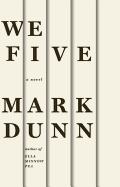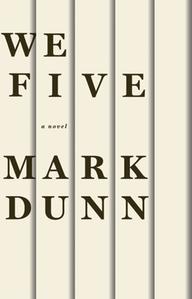
 Mark Dunn (Ella Minnow Pea) delivers another high-concept, wildly inventive novel that tells a timeless story. We Five traces the tragic consequences of five sheltered young women responding to the amorous overtures of five young men with less than honorable intent.
Mark Dunn (Ella Minnow Pea) delivers another high-concept, wildly inventive novel that tells a timeless story. We Five traces the tragic consequences of five sheltered young women responding to the amorous overtures of five young men with less than honorable intent.
The novel combines five versions of this basic story, moving around from Manchester, England, in 1859, to San Francisco, Calif., just before the earthquake of 1906; Sinclair Lewis's fictional town of Zenith, Winnemac, in 1923; London in 1940, during the Blitz; and small-town northern Mississippi in 1997. Jane, Maggie, Carrie, Ruth and Molly are the five women who populate each story. "Sisters of the heart," they gradually become aware of their would-be suitors' deceit and begin to resist. Their efforts are abetted and sometimes complicated by their web of relationships with their families and each other, through a series of increasingly disastrous events. All five versions collide in one apocalyptic climax, which gives way to a startling and triumphant conclusion.
Dunn's structure is ingenious. He tells the story through five distinct voices, against five historic backdrops, but keeps his characters' names, personalities, families and dynamics constant. The result is a seamless narrative with a straightforward plot that hopscotches through time. The five voices and five eras also underscore themes of inevitable conflict between genders and generations, and the power of family and friendship. In Dunn's telling, men justify all manner of violent behavior, often directed at women. However, women are not simply victims; they have the power to absolve men when the violence is warranted, and so Jane's brother, who has killed in war and in defense of Jane, can be forgiven.
Dunn's pyrotechnics have a mixed effect. They sometimes eclipse the emotional heart of the story, especially in the novel's second half, where critical events can feel gratuitous and over-the-top. For example, Molly's father, outraged by the sinister advances of her paramour, fatally attacks him in a tragic scene that is jarring given the sensitive depiction of the five women's emotional lives in earlier chapters. The nightmarish climax, with its glorious epilogue, is yet another hairpin turn, but it provides a satisfying conclusion and transforms We Five into something much more complex and interesting than another harrowing story about the injustice and hurt that men inflict on women. Ultimately, We Five is an exuberantly clever if uneven story with a fresh take on gender dynamics, female friendship and the universal search for love. --Jeanette Zwart, freelance writer and reviewer
Shelf Talker: Five narratives tell a single story about women struggling against the deceits of the young men pursuing them--an entertaining and clever read that upends expectations of gender relationships.

